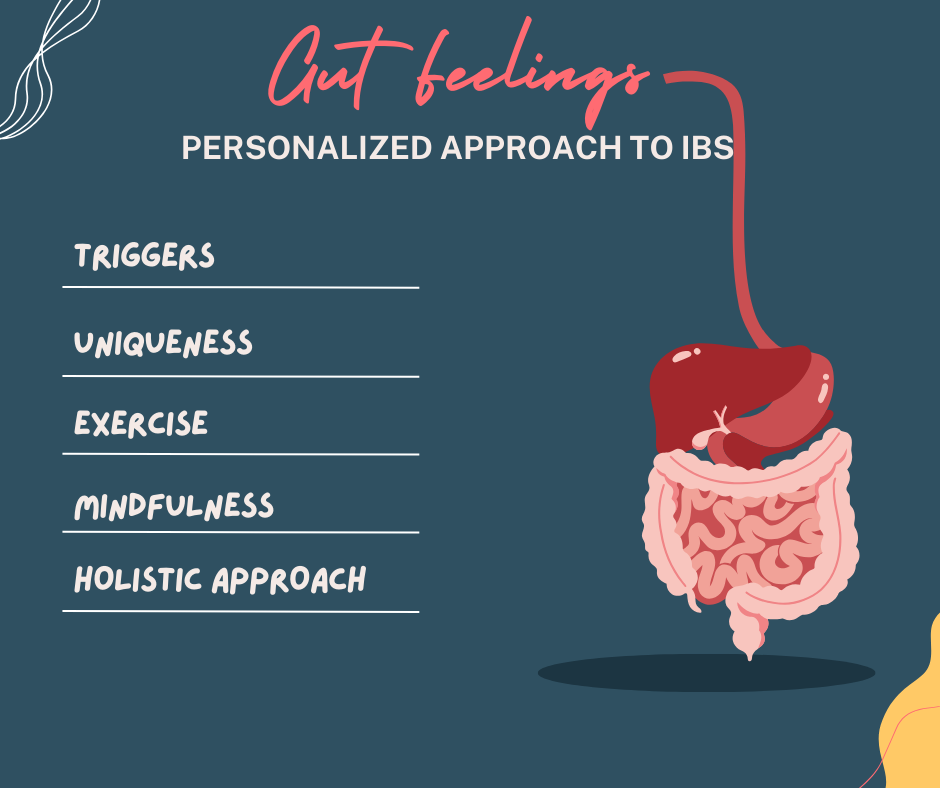There is a lot of buzz about gut health these days. In this blog let us explore gut health and the complexities of living with Irritable Bowel Syndrome (IBS). Our journey into understanding the intricate relationship between the gut and overall well-being begins here. The gut, often referred to as our ‘second brain,’ plays a crucial role in our physical and emotional health. However, when the delicate balance of the gut is disrupted, it can lead to a range of gastrointestinal issues, with IBS being one of the most prevalent. Let us as we delve into the world of IBS, unraveling its symptoms, diagnosis, and personalized management strategies.
Definition:
Irritable bowel syndrome (IBS) is a chronic gastrointestinal disorder characterized by a combination of symptoms, including abdominal pain or discomfort, bloating, and changes in bowel habits such as diarrhoea, constipation, or both. Despite its prevalence, IBS lacks visible signs of damage or disease in the digestive tract. **

Symptoms:
- Changes in Bowel Movements: Individuals with IBS may experience alterations in their bowel habits, ranging from diarrhea to constipation or a combination of both.
- Abdominal Discomfort: Pain and bloating in the abdominal region are common symptoms associated with IBS.
Diagnosis of IBS: Diagnosing IBS involves a comprehensive evaluation of symptoms and medical history. While there is no definitive test for IBS, healthcare providers may consider the following factors:
- Symptom Pattern: Recurrent digestive disturbances and specific patterns in symptoms help identify potential IBS.
- Family History: A family history of gastrointestinal issues, coupled with genetic predispositions, can contribute to the diagnosis.
- Gut Microbiome Analysis: Assessing the composition of gut bacteria through microbiome tests aids in understanding the underlying mechanisms of IBS.
- Specific Tests: Additional tests may be recommended by healthcare providers to rule out other gastrointestinal conditions and confirm the diagnosis.

Personalized Management of IBS: It’s crucial to acknowledge that IBS is highly individualized, and management strategies should be tailored to each person’s unique triggers and needs. Here are five essential considerations for individuals with IBS:
- Identify Triggers: Understanding personal triggers, such as certain foods (e.g., dairy, gluten, or high-fiber foods), stress, or lifestyle factors, empowers individuals to manage their symptoms effectively
2. Remember you are unique: While IBS is prevalent, each person’s experience is unique. Avoid comparing treatment approaches with others and focus on personalized strategies that address your specific triggers and requirements.
3. Regular Exercise: Engaging in regular physical activity, such as yoga, walking, or low-impact exercises, can improve digestion, reduce stress, and alleviate symptoms associated with IBS. Consult with a healthcare provider to determine the most suitable exercise regimen for your individual needs.
4. Practicing Mindfulness: Cultivating mindfulness around eating habits can have a significant impact on managing IBS symptoms. Paying attention to portion sizes, chewing food thoroughly, and eating slowly can aid digestion and reduce discomfort. Additionally, keeping a food diary to track symptoms and dietary intake can help identify trigger foods and patterns, empowering individuals to make informed choices about their diet. Embracing mindful eating practices fosters a deeper connection with food and promotes overall digestive health and well-being. Remember, it’s essential to seek professional guidance for personalized recommendations and timely intervention to address emotional imbalances.
5. Holistic Approach: Approaching a therapist can enhance the management. A holistic approach considers various factors, including dietary habits, lifestyle choices, constitutional factors (e.g., Ayurvedic doshas), sleep patterns, and emotional well-being.
At OlivebyRenuka, we advocate for an integrated approach to managing IBS, beginning with a thorough assessment of various factors. This holistic approach ensures personalized care that addresses the unique needs of each individual. Here’s a breakdown of our integrated approach:
- Current Dietary Habits: Understanding an individual’s current dietary habits through detailed recall allows us to tailor dietary recommendations based on their constitution and preferences. This personalized approach optimizes symptom management and promotes digestive well-being.
- Lifestyle Analysis: Delving into aspects of an individual’s lifestyle, such as work dynamics, stress levels, and exercise routines, provides crucial insights for crafting effective management strategies. By addressing lifestyle factors, we aim to create a supportive environment conducive to digestive health.
- Constitutional Considerations: Recognizing the individual’s constitution, whether categorized as vata, kapha, pitta, or a combination thereof, offers valuable guidance for personalized management. For example, while eliminating gluten and incorporating millets may benefit individuals with a predominant pitta constitution, it may exacerbate symptoms for those with a vata constitution due to millets’ inherent dryness. By acknowledging these nuanced differences, we tailor dietary recommendations to optimize outcomes for each individual.
- Sleep Quality: Prioritizing adequate and restorative sleep is essential for maintaining healthy bowel function. We emphasize the importance of ensuring a minimum of 7-8 hours of uninterrupted sleep each night. Addressing any sleep disturbances promptly is integral to promoting overall well-being and symptom management.
- Emotional Well-being: Acknowledging the significant role of emotional health in triggering and exacerbating IBS symptoms, we emphasize the importance of managing stress and addressing emotional imbalances. Therapeutic interventions, such as counseling and mindfulness practices, empower individuals to cultivate resilience and foster a harmonious mind-gut connection. By prioritizing emotional well-being, we aim to mitigate the impact of stress on digestive health and enhance overall quality of life.
By integrating these components into our approach, we strive to provide comprehensive care that addresses the multifaceted nature of IBS and empowers individuals to embark on a journey towards improved digestive health and well-being.
** https://www.niddk.nih.gov/health-information/digestive-diseases/irritable-bowel-syndrome

